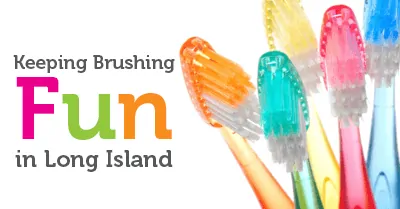
As a parent, you try to make brushing, flossing, and overall oral hygiene fun for your kids. At first, they may really enjoy the cool toothpaste, the brightly colored toothbrush, and the floss they can twirl around their fingers. After all, you’re finally letting them put something in their mouths instead of constantly telling them, “Don’t chew on that!” and “Get that out of your mouth!” Although oral hygiene can start out as something fun, kids can quickly get bored and start to neglect their teeth. So how do you know if they’re properly brushing, or if they’re brushing at all? At our Long Island pediatric dental office, we’d like to give you a few sleuthing tips and clues that you can use to see if your child is brushing or not.
A good general rule of thumb for anyone, even kids with baby teeth, is to brush for at least 2 minutes. Anything faster and there’s a good chance a whole bunch of germs, bacteria, and food debris is getting missed, increasing the chance of cavities. If your child is rushing through this routine, it’s important to explain why brushing each section of their mouth is important. Need a little more motivation? Use music that lasts for at least 2 minutes and challenge them to brush for the whole song. There are also brushes designed for children with built in timers that play music, light up or vibrate that can helyour child make sure that he/she gets to two minutes.
When your child says they’re finished brushing their teeth, ask them to see their pearly whites and give you a big grin. If food particles are visible, chances are they didn’t brush well enough, if at all. Another giveaway you can look for during the post-brush grin test is if their tongue is white. If it is, it’s loaded with bacteria that would have been taken off with a thorough brushing. Send them back to the sink and explain the importance of a good brushing, including the tongue. And don’t forget to check that toothbrush. We have had many parents tell us that the toothbrush is dry when they check it!
If your child has bad breath, there’s a good possibility their oral hygiene habits are slacking. Bad breath doesn’t necessarily come from what you eat, but is more a result of built up bacteria (this goes for adults too!). If after a breath check you’re wincing and pinching your nose, send your kid to brush and keep monitoring their breath. If it is chronic and your child is brushing effectively, then it may indicate a gastrointestinal issue, or congestion from allergies that causes mouth breathing.
We hope that our clues have given you some good information on how you can help make sure your child’s at-home oral hygiene is being done, and being done correctly. In addition to at-home care, it’s extremely important that your child visits our Long Island pediatric dental office regularly so we can ensure their smiles are growing strong and healthy. In the meantime, happy sleuthing! We hope you find only good things!